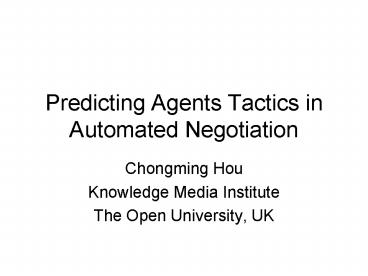Predicting Agents Tactics in Automated Negotiation - PowerPoint PPT Presentation
1 / 18
Title:
Predicting Agents Tactics in Automated Negotiation
Description:
Jointly exploring the space of possible deals to reach an agreement. Negotiation ... Buyer: Conceder, Linear, Boulware, Impatient, Steady, Patient, Average TFT, ... – PowerPoint PPT presentation
Number of Views:77
Avg rating:3.0/5.0
Title: Predicting Agents Tactics in Automated Negotiation
1
Predicting Agents Tactics in Automated Negotiation
- Chongming Hou
- Knowledge Media Institute
- The Open University, UK
2
Outline
- Negotiation
- Decision Functions
- Learning Approach
- Negotiation Heuristics
- Performance
- Discussion
- Conclusion
3
Negotiation
- Jointly exploring the space of possible deals to
reach an agreement - Negotiation
- Language and ontologies
- Agent communication language (ACL),KQML
- Content language SL,RDF
- Protocol
- Ask, broker, bid, respond, agree
- Decision
- Policies, strategies, tactics
4
Negotiation Decision Model
- Two party adopting opposing roles, such as buyer
and seller - Alternating offers
5
Related Work
- Game theory
- Assumes common knowledge and perfect rationality
- Decision functions
- Time-dependent tactics
- Resource-dependent tactics
- Behaviour-dependent tactics
6
Decision Parameters
- Reservation values for seller and buyer mins,
maxb - Initial offer level k
- Deadline (time available) tmax
- Rate of concession ß/µ/?/d,
- Number of negotiating agents N(t)
- Communication cost Xs?b
7
Decision Functions
- Time
- Polynomial
- Exponential
- Resource ,
- Behaviour
- AvgTFT RelTFT
- RndTFT
8
Time Dependent Functions
9
Motivation
- Related work on decision functions
- Require prior probability distribution of
opponents deadline and reservation value - Require knowledge of opponents tactic type
- Research questions
- How can an agent learn the opponents tactics?
- How can knowledge of the opponents tactic be
used to achieve the optimal outcome for the
predicting agent?
10
Learning Approach
- Use nonlinear regression to learn an opponents
tactic - Discriminate which of the three families of
tactics the opponent has adopted - Predict the opponents future offers
- Identify the opponents tactic type
- Estimate the opponents reservation value and
deadline
11
Negotiation Heuristics
- Three sets of heuristics
- Boulware, Conceder and Resource tactics
- Example Opponent is a Time-Dependent (min SSR),
Conceder (ßgt1) tactic - Accept the opponents offer if
- offer(tn) - max lt 0.5 ln(max), or
- a gt 0.90 to 0.98, or
- tn - tmax lt 1, or
- offer(tn) - offer(tn-1) lt max 1
12
Performance
- Time-dependent
- Conceder ß 20, 30, 40, Linear ß 1
- Boulware ß 0.025, 0.1, 0.2
- Resource-dependent
- Impatient µ 1, Steady µ 2, 3, 5,
Patient µ 6, 8, 10 - Behaviour-dependent
- Average Tit-For-Tat ? 1, 2, 3, 5, 6, 8, 10,
- Relative TFT d 1, 2, 3, 5, 6, 8, 10,
- Random TFT d 1, 2, 3, 5, 6, 8, 10, M 1, 3
13
Performance
- Performance function
- Pairwise comparison of 90 paired conditions
- Buyer Conceder, Linear, Boulware, Impatient,
Steady, Patient, Average TFT, Relative TFT, and
Random TFT - Seller Conceder, Linear, Boulware, Impatient,
Steady, Patient, Average TFT, Relative TFT,
Random TFT, and Prediction
14
Performance Time
- The performance of the sellers learning
mechanism against the time-dependent buyer
15
Performance Resource
- The performance of the sellers learning
mechanism against the resource-dependent buyer
16
Performance Behaviour
- The performance of the sellers learning
mechanism against the Tit-For-Tat dependent buyer
17
Discussion
- Withdraw from pointless negotiation
- Withdraw from unprofitable negotiation
- Avoid breakdown and make best deal
18
Conclusion
- Predict opponents behaviour
- Effectively
- Detect the pointless negotiation
- Balance future gain and cost
- Avoid breakdown of negotiation whilst making a
the best deal at the opponents reservation value - Online
- Without prior knowledge about opponent
- Based only on the opponents previous offers
- These characteristics give this method
significant practical value in negotiation































